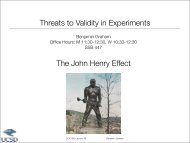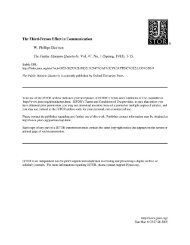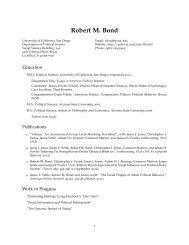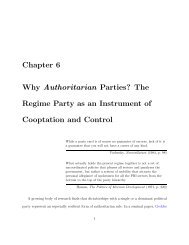Popkin-Reasoning Voter-Ch 3.pdf
Popkin-Reasoning Voter-Ch 3.pdf
Popkin-Reasoning Voter-Ch 3.pdf
You also want an ePaper? Increase the reach of your titles
YUMPU automatically turns print PDFs into web optimized ePapers that Google loves.
<strong>Ch</strong>apter Three<br />
accessible, and economical estimates of candidate behavior.53 It has often<br />
been noted that the use of demographic cues in voting probably plays a<br />
more important role in American campaigns than it does in those of more<br />
homogeneous countries.<br />
There is a good deal of survey data to suggest that when voters believe<br />
govemment is closer to thffffiare more likely to beGiE-They gef their<br />
n the<br />
meney;<br />
,@otethatissooftendisparagedasirrelevant.5aAc-<br />
tually, it is an example of low-information rationality: using an easy-toobtain<br />
cue to assess a candidate's positions. Particularly on distributive issues-which<br />
neighborhood to tear up for a highway, where to put the<br />
toxic-waste dump, where to build a prison, an airport, or a park, whether<br />
to allow offshore drilling, where to disburse patronage-localism may be<br />
an effective orientation for the voter to use in trying to predict a legislator's<br />
preferences. In addition, localism is of some value in determining the capabilities<br />
of the candidate. When a candidate is in some sense a neighbor,<br />
the voter at least has a better chance of knowing whether he or she is a<br />
blatant crook or an obvious fool. Given thg problems of expensive, scarce,<br />
and unreliable information about the candidates, the voter is more likely to<br />
have confidence in a neighbor with a local reputation for competence.<br />
Further, because voters are necessarily uncertain about what a candidate<br />
willdoifelected,theytakeintoaccountthecsof<br />
the candidate's supporters. Endorsements from feminists, blacks, <strong>Ch</strong>ristian<br />
ions, military veterans, and many other demographic<br />
groups make a diference. This process of inferring the candidate's<br />
policy preferences from his or her demographic characteristics is the political<br />
equivalent of screening job applicants by reading their r€sumds instead<br />
of by evaluating their work, which would take more time and effort. Television<br />
appearances and televised convention proceedings offer quick visual<br />
clues to the candidate's support groups, and thus make it harder for candi-<br />
dates to pretend to be all things to all people. "If they are supporting him," a<br />
voter may ask, "how can he be good for me7'When candidates become<br />
aware of such an attitude, they try to change it by offering low-information<br />
cues that encourage support for demographic reasons. Thus the black mayor<br />
of Los Angeles, Tom Bradley, reminded voters of his experience as a<br />
policeman; the wealthy George Bush talked of his down-home love of<br />
pork rinds and horseshoe pitching; and Michael Dukakis, the governor of<br />
Massachusetts-a state thought to be liberal and therefore soft on defense-went<br />
for a ride in an Army tank.<br />
&<br />
,{<br />
t<br />
f I<br />
$<br />
s<br />
,,,,<br />
x<br />
E<br />
s<br />
$<br />
*<br />
,f<br />
1 a<br />
1<br />
Going without Data<br />
When voters watch a candidate perform on television, making promises<br />
,rrtrl taking hard-line rhetorical positions on issues, they question if there is<br />
r (f llgruence between avowal and actual feelings-whether the candidate's<br />
rttltport for a cause represents a genuine personal commitment or only a<br />
t',ltnpaign tactic.55 We care more about Sincerity and character when we<br />
,1t'('uDC€rtain aboutwhat someone will do. As Aristotle noted, "We believe<br />
good men more readily and fully than others; this is true generally whatt'v('r<br />
the question is, and absolutely true where exact certainty is impossible<br />
+rrrtl opinions are divided."56 This is often the case in daily life, when we<br />
tttttsl. make evaluations with limited information and no theory to guide<br />
tts. How do we choose a new baby-sitter for our young children when we<br />
lllllst make an emergency trip? How do we choose a nurse for a critically<br />
alling parent who lives at the other end of the continent? We want to hire<br />
r'tttttpetent people, but without the time or resources to evaluate their past<br />
perlirrmance, we must make a judgmentbased largely on clues to personal<br />
t lt,tracter, from a conversation or from what our friends tell us; will this<br />
ll('rson do what we would like to have done? Delegation in such situations<br />
Irrvolves emotions and values and bondq bet tu.rllrul<br />
empathy and understanding, deciding who shares one's own<br />
t'rltt('crns. A voter wonders, therefore, about whether a candidate cares<br />
alrout people like himself or herself.<br />
When voters estimate a candidate's preferences they take account of<br />
rlttt't'rity-whether the candidate really cares about their concems. Ber<br />
rtttsc it is difficult, for example, to assess whether a compromise bill was<br />
llte bcst that could be done, or whether a politician reneged on his commitlltt'ttls,<br />
they take shortcuts: they estimate publ@ter<br />
ftottt private morality and character, assuming in the absence of better inf,rrrrra<br />
eir constituents like they treat their own<br />
rltouscs and children.<br />
Incumbenqt<br />
Itt 1940, the elaborate methods used to assess the effects of the media on<br />
llte ltresidential votoproduced no positive results. In that year, with Frankllrr<br />
l). Roosevelt running for a third term against Republican Wendell<br />
Wlllkle, only 8 percent of all voters changed their minds at any time during<br />
llte slx-month period from May through September.5T This result is a strik-<br />
Itlg clemonstration of the fact that when the voter estimates competence,<br />
lltere ls an asymmetrybetween candidates. Forcandidates who are incumhelrts.clr<br />
who have spent a long period of time in a prominent position,<br />
65











